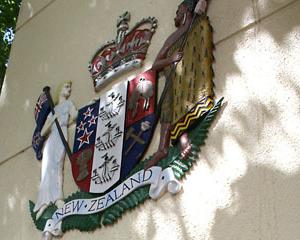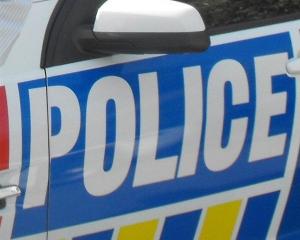A police constable who claimed two fellow Dunedin officers assaulted a suspect has denied he was blaming the other officers for injuries he caused.
Constable Johnathon Dunn, a Crown witness in the trial of Constables Brenton David Rooney (33) and Duncan Roy Hollebon (37), told the Dunedin District Court yesterday he and his partner were on the suspect's left side, trying to get the man's arms from beneath his body so they could handcuff him.
Because they were not getting anywhere, he punched the man two or three times in the ribs as a "pain compliance measure".
Hollebon arrived and kicked the suspect a couple of times in the ribs. He then helped handcuff him.
Rooney arrived and kicked the man in the head before Hollebon returned and kicked him in the right shoulder.
All were hard "walking" kicks, not taps, the witness said.
He took the man to the police station, and later to the hospital on the instructions of a senior officer.
Rooney and Hollebon are accused of assaulting Mosgiel man Daniel Murray Wiel with intent to injure him on February 15 last year.
Rooney also faces an alternative charge of intentionally injuring Mr Wiel.
Both officers deny the charges.
Their trial, before Judge Paul Kellar and a jury, is expected to take three or four days.
- For full ongoing coverage of this trial buy tomorrow's print Otago Daily Times
Crown counsel Mary-Jane Thomas, of Invercargill, said Hollebon recorded assisting two other constables trying to move Mr Wiel's arms from beneath his body so they could handcuff him.
He also said that, because Mr Wiel was non-compliant, he used his right knee to exert some "pain compliance".
Rooney's explanation was he went to assist in the arrest and lost his footing, sliding or falling into the group.
He came into contact with someone but was not sure who and had assisted another officer to restrain the struggling complainant.
Rooney also said he had put his knee on Mr Wiel's left shoulder to make him comply.
Although police could use some force in the course of their duties, "that force must always be reasonable, necessary and proportionate", Miss Thomas said.
Under cross-examination by Hollebon's counsel, Anne Stevens, Const Dunn agreed the incident lasted only a minute or two.
He had noticed blood on his shirt which could have come from an injury to Mr Wiel's face but had taken the shirt home to be washed without the blood being tested.
He agreed he had been concerned when Mr Wiel complained at the hospital about being assaulted by police but when a staff member asked how the injuries happened he said he thought it was either from Mr Wiel coming off a motorcycle or when he pushed him to the ground.
He denied lying to hospital staff.
"I don't know how he got the injury," he said.
Const Dunn agreed he had not recorded anything in his notebook about any kicking by Hollebon, that he had "typed that up at home later", but denied his notebook was incorrect.
He agreed his offence report, traffic report and force report had not mentioned any kicking.
He denied a suggestion from Mrs Stevens that he had blamed Hollebon and Rooney for injuries he had caused himself.
"I suggest you said nothing about him being kicked because it didn't happen," she said.
Mr Wiel told the court he had been riding a motorcycle that was not his.
It was unregistered and did not have its lights on.
He did not have a licence and was not wearing a helmet.
Police began pursuing him just past Queens Gardens on the one-way south.
He tried to evade them by turning up a side street, then riding the wrong way down Crawford St in the parking lane, but was blocked by a police car so he locked up the brakes, dropped the bike and ran north.
When another police vehicle blocked him he decided it was time to give up and lay on the ground with his arms beneath him.
There was "a bit of a struggle" as an officer knelt on him, trying to get his arms behind his back.
He was eventually handcuffed, then more officers arrived and he was struck on the face and the side of his body.
He was kicked two or three times on the face and head but did not see who was responsible.
His face was grazed because it was resting on the ground when he was kicked.
He then felt two or three blows to his body in the kidney area.
After that he was taken to the police station and then to hospital, although he did not remember that part.
"I must have passed out," he said.
An injury to his eye was stitched and he later had bruising around both eyes and on his face.
As a result of the motorcycle incident, he was charged and sent to prison, Mr Wiel said.
He said he did not recall asking for his injuries to be photographed at the hospital, but might have.
When hospital staff asked how he got the injuries, he remembered telling them " the cops had bashed" him.
He could not remember which officer was at the hospital with him as he was "pretty confused" and one of his eyes was full of blood so he could not see clearly.
He said he also had a broken nose.
To Mr Farrow, he said he did not believe he had injured himself when he lay on the ground or in any struggle.
And he said he was already handcuffed when he was kicked, although he agreed that was not what he said at the preliminary hearing.
He agreed he told hospital staff the police had kicked him but had not mentioned being unconscious, although he believed he was as he could not remember arriving at the hospital.
And if a doctor said he did not have a broken nose, the doctor was wrong, Mr Wiel said.












